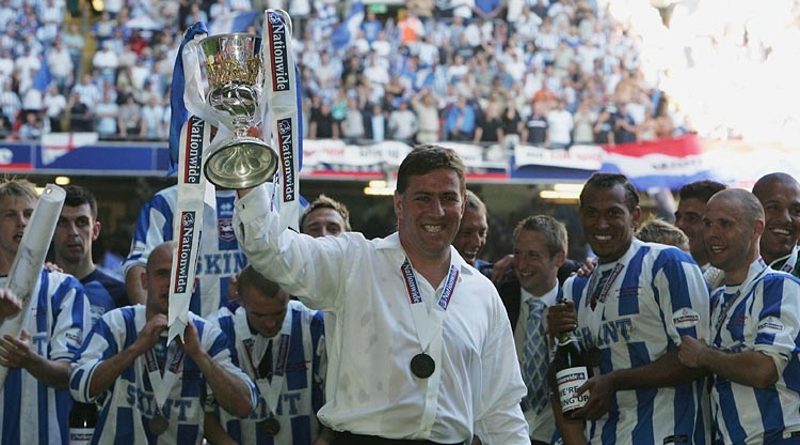Brighton history shows Potter departure need not be a disaster
The level of hysteria which has greeted the news that Graham Potter is set to walk out on Brighton to become the new manager of Chelsea has in some quarters been greater than when Princess Diana died.
Talk of giving up season tickets. That there is no point in the Albion carrying on if they cannot keep their manager. That we are destined now to slink back to the Championship, League One or League Two.
Please. Potter is not the first manager to abandon ship, believing he is heading to bigger and better things. And unless the Albion become the richest club in the world capable of winning every single trophy going, he will not be the last either.
These levels of despair stem from the fact that it is 19 years since the Albion last had a manager poached. The entire Amex generation of supporters – and even those too young to attend the first four seasons at Withdean – have never experienced that end-of-the-world feeling that comes when a successful boss walks away.
They have not suffered a Brighton manager leaving for Reading. Or Leicester City. Or Port Vale. Or Nottingham Forest. Or The Leeds United. Or Birmingham City.
It might seem like all hope has gone right not. Like the Seagulls have had their wings clipped just when it looked like something special was happening under Potter.
History though shows us that Brighton losing Potter may not be the disaster many are predicting. Where the door of the Potter Era closes, so the door of opportunity opens for another head coach to come in and continue the story.
Steve Coppell was the last manager to quit Brighton to go elsewhere, favouring taking over at Reading in October 2003. Six months later and the Albion won promotion in one of the greatest days in the club’s history, beating Bristol City 1-0 in the Division Two playoff final.
Mark McGhee proved to be a more than adequate replacement for Coppell. He went onto keep the Albion in the Championship against all odds for two seasons.
McGhee also provided constant entertainment with bizarre post-match interviews, chucking players off the team bus at away games on two occasions and making wild and whacky team selections that could only have been dreamt up after several pints of whiskey.
Brighton were not hurt by Coppell’s departure. Neither were they hurt by Micky Adams quitting in October 2001 to become number two to Dave Bassett at Leicester.
When Adams left, it felt similar to Potter going. Adams had hauled the Albion from the bottom of Division Three, won the title and had Brighton in the hunt for back-to-back promotions at the point he decided to walk away.
Dick Knight was the man who saved the Albion off-the-pitch in the late 90s; Adams was the man who saved the Albion on it with his total rebuild of the club.
Knight though was undeterred by Adams leaving. He appointed Peter Taylor as in place of Adams. Taylor never lost a home game at Withdean, winning the Division Two title by building on Adams’ work.
Shrewd additions coupled with a couple of tactical tweaks made Taylor’s Brighton even better than Adams’ Brighton.
Not many people thought that possible when Adams was packing his bags for Filbert Street. Perhaps Potter’s replacement will have a similarly surprising impact, from what a lot of Albion fans seem to believe is a hopeless position?
Brian Horton was lured by the bright lights of Port Vale in January 1999. Knight made a mistake initially in promoting Jeff Wood to the top job.
Internal appointments have never worked at the Albion, which offers some food for thought for those wanting Bruno to take on his first managerial role in place of Potter.
When Wood was sacked after just three months, in came Adams. The transformation of Brighton from bottom tier also rans to a side playing one level below the Premier League three-and-a-half years later could begin.
Had Horton not gone to Vale Park and Adams never been appointed, how different might Albion history look?
Go back to the 1970s and you find further evidence that Potter leaving Brighton might not be a cataclysmic event.
The first Peter Taylor resigned as Brighton manager in the summer of 1976 to re-join his good mate Brian Clough as assistant at Nottingham Forest.
Mike Bamber appointed Alan Mullery in Taylor’s place. Mullery won promotion from the old Division Three at the first attempt, followed by promotion from Division Two in 1979.
Brighton went from third tier to top tier inside of three seasons in the immediate aftermath of Taylor joining Forest.
Taylor himself had taken the Albion job three years earlier when Clough left for The Leeds United in 1974. Taylor laid the foundations over his two years in charge which put Brighton in the position to challenge for promotion under Mullery, including signing the likes of Peter Ward, Ian Mellor and Horton.
Lastly, there was Freddie Goodwin. Brighton manager between 1968 and 1970, he left ahead of the 1970-71 season to take over at Birmingham.
In came Pat Saward, who became only the second even manager to win promotion for the Albion to the second tier at the end of the 1971-72 campaign. It was arguably the most unexpected promotion in Brighton history.
When all of those managers walked out on Brighton, their successors were appointed with nowhere near the thorough detail or process that Tony Bloom will put into replacing Potter.
Knight would interview potential bosses in his favourite Italian restaurant. He would also sack them there or in the Little Chef at Hickstead services on the A23.
Bloom will have long planned for Potter leaving one day. He will have a first, second, third, fourth and fifth choice to take over.
Just as he had already identified Potter as the manager he wanted to succeed Chris Hughton long before the time came to relieve Hughton of his duties.
Potter walking out on Brighton for Chelsea is a setback. But history shows that Brighton not only overcome these sorts of setbacks quickly, but often they bounce back to scale even greater heights.
Have faith in Bloom to get it right and the Seagulls can continue soaring. Our club is bigger than any one manager. Bring on the post-Graham Potter era.




